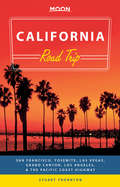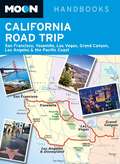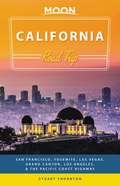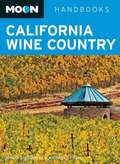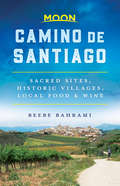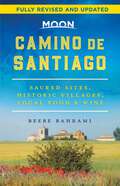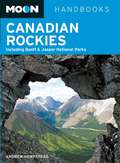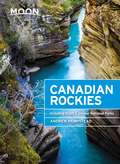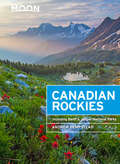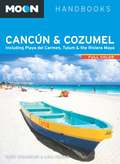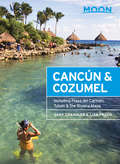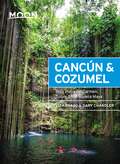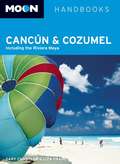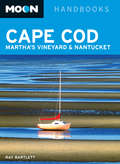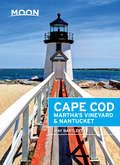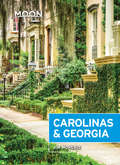- Table View
- List View
Moon California Hiking: The Complete Guide to 1,000 of the Best Hikes in the Golden State (Moon Outdoors)
by Ann Marie Brown Tom StienstraPack a lunch, lace up your boots, and head out to discover the best hiking trails in the Golden State with Moon California Hiking.A Hike for Everyone: Pick the right hike for you, from breathtaking coastal walks to challenging backcountry treks, with options ranging from easy day hikes to multi-day backpacking tripsBest Hikes Lists: Choose from strategic lists of the best hikes for kids, bird-watching, redwoods, vivid fall colors, waterfalls, wheelchair-accessibility, and moreEssential Planning Details: Each hike is marked with round-trip distance and estimated hiking time, as well as rated for scenic beauty and trail difficultyMaps and Directions: Find easy-to-use maps, driving directions to each trailhead, and details on where to parkSkip the Crowds: Have the trail to yourself with recommended off-the-radar hikes Expert Advice: Seasoned hikers Tom Stienstra and Ann Marie Brown offer their trusted insight and honest opinions on each trailTips and Tools: Advice on gear, first aid, camping permits, and ethical hiking, plus background information on climate, landscape, and wildlifeWhether you're a veteran or a first-time hiker, Moon's comprehensive coverage and honest expertise will have you gearing up for your next adventure.Exploring more of the Golden State? Try Moon California Camping. Hitting the road? Check out Moon California Road Trip.
Moon California Road Trip
by Stuart ThorntonSee the top destinations in the American West with this book as your guide. Our detailed driving routes give you all you need, including mileage from place to place, driving times, and advice on the best places to stop along the way to eat, sleep, and explore.Choose the road trip that's best for you: The 14-Day Best of the West San Francisco, Yosemite, and Los Angeles in Six Days Los Angeles, Las Vegas, and the Grand Canyon in Four Days Two Days in San Francisco Two Days in Los Angeles Two Days in Las VegasA vibrant full-color interior includes 50 easy-to-use maps to keep you oriented on and off the highway.
Moon California Road Trip
by Travel AvalonThe top destinations in the West are within a day’s drive of one another. See them all withMoon California Road Tripas your guide. Detailed driving instructions tell you how far you’ll have to drive, how long it will take, and which highways you’ll need to follow-including information on alternate routes and the best places to stop along the way. Day-by-day itinerary suggestions tell you the best ways to spend your time: The 14-Day Best of the West Three Days in San Francisco Three Days in Los Angeles Three Days in Las Vegas One Day in Yosemite One Day in the Grand Canyon Day Trips to Wine Country And 36 easy-to-use maps keep you oriented along the way.
Moon California Road Trip: San Francisco, Yosemite, Las Vegas, Grand Canyon, Los Angeles & the Pacific Coast (Travel Guide)
by Stuart ThorntonHit the Road with Moon Travel Guides!From the waterfalls of Yosemite and the colorful Grand Canyon to the Hollywood Walk of Fame and the Golden Gate Bridge, cruise through the best of the West with Moon California Road Trip. Inside you'll find:Maps and Driving Tools: Over 40 easy-to-use maps keep you oriented on and off the highway, along with site-to-site mileage, driving times, and detailed directions for the entire routeEat, Sleep, Stop and Explore: With lists of the best hikes, views, restaurants, and more, you can ride a cable car in San Francisco or hike Half Dome, descend deep into the Grand Canyon, or hit the waves in a classic SoCal surf town. Wander through history at Alcatraz, snap a photo at Big Sur, or marvel at jellyfish at the Monterey Bay Aquarium. Chow down on an authentic Mission burrito, lunch on fish tacos by the beach, or watch the sunset from a rooftop bar in Los AngelesFlexible Itineraries: Drive the entire two-week "Best of the West," mix and match destinations for shorter road trips, or follow strategic itineraries for spending time in San Francisco, Yosemite, Las Vegas, the Grand Canyon, Los Angeles, and smaller towns along the Pacific Coast HighwayLocal Insight: Surfer and adventurer Stuart Thornton shares his thirst for the next secluded beach, quirky pit stop, and mountaintop vista Planning Your Trip: Know when and where to get gas, how to avoid traffic, tips for driving in different road and weather conditions, and suggestions for international visitors, LGBTQ+ travelers, seniors, and road trippers with kidsWith Moon California Road Trip's practical tips, detailed itineraries, and local expertise, you're ready to fill up the tank and hit the road.Doing more than driving through? Check out Moon California, Moon Grand Canyon, or Moon Yosemite, Sequoia & Kings Canyon.
Moon California Road Trip: San Francisco, Yosemite, Las Vegas, Grand Canyon, Los Angeles & the Pacific Coast (Travel Guide)
by Stuart ThorntonColorful cable cars, sunny beaches, seaside havens, and thundering waterfalls: Buckle up for the best of the Golden State with Moon California Road Trip. Inside you'll find:Flexible Itineraries: Drive the entire "Best of the West" loop, mix and match destinations for shorter road trips, or follow strategic itineraries for spending time in San Francisco, Yosemite, Las Vegas, the Grand Canyon, Los Angeles, and smaller towns along the Pacific Coast HighwayEat, Sleep, Stop and Explore: Experience California and the Southwest your way with lists of the best hikes, views, restaurants, and more. Conquer Half Dome, stroll across the Golden Gate Bridge, venture into the depths of the Grand Canyon, or snap a picture on the Hollywood Walk of Fame. Step back in time at Alcatraz, tour the opulent rooms of Hearst Castle, or marvel at the jellyfish at the Monterey Bay Aquarium. Satisfy your cravings with an authentic Mission burrito, be dazzled by an over-the-top Las Vegas show, or enjoy a technicolor sunset from a rooftop bar in Los AngelesMaps and Driving Tools: Over 40 easy-to-use maps keep you oriented on and off the highway, along with site-to-site mileage, driving times, and detailed directions for the entire routeLocal Insight: Surfer and adventurer Stuart Thornton shares his passion for the state's best secluded beaches, quirky pit stops, and mountaintop vistasPlanning Your Trip: Know when and where to get gas, how to avoid traffic, tips for driving in different road and weather conditions, and suggestions for international visitors, LGBTQ+ travelers, seniors, and road trippers with kidsHelpful resources on Covid-19 and traveling in CaliforniaWith Moon California Road Trip's practical tips, detailed itineraries, and local expertise, you're ready to fill up the tank and hit the road. Doing more than driving through? Check out Moon Los Angeles, Moon Grand Canyon or Moon Yosemite, Sequoia & Kings Canyon.
Moon California Wine Country
by Philip Goldsmith Michael CervinLocals and wine lovers Philip Goldsmith and Michael Cervin have the inside scoop on how to best experience California's Wine Country, from swirling and sniffing lessons at Yountville's Goosecross Cellars to glider rides over scenic Santa Ynez Valley. Goldsmith and Cervin offer great trip ideas, including Weekend Wine Warriors, Understanding California through Wine, and Highway Hugging. Whether you're planning on doing some serious wine-tasting or simply taking a leisurely trip through some of California's most beautiful areas, Moon California Wine Country gives you the tools you need to create a more personal and memorable experience.
Moon California: Including Las Vegas (Travel Guide)
by Elizabeth Linhart VenemanDiscover California with Moon Travel Guides!California is larger than life: cities are livelier, forests and mountains loom taller, and sandy coastlines stretch as far as the eye can see. Moon California has tips for both locals and out-of-towners looking to discover all that California has to offer.What You'll Find in Moon California: Expert advice from Golden State connoisseur Elizabeth Linhart VenemanItineraries for every timeline and budget, from two days in San Francisco to two weeks on the road, including: The Best of California in One Week, Wine Country, Shasta and Lassen, The Best of Lake Tahoe, Yosemite, Sequoia, and Kings Canyon, Palm Springs and the Deserts, and Las VegasIn-depth coverage of the major cities, including San Francisco, Los Angeles, and San DiegoBonus coverage of Las Vegas for travelers and California locals alike looking to explore more of the West CoastFull-color, easy-to-navigate maps with vibrant, helpful photosIdeas for every traveler and every season: indulge your inner oenophile in California's world-renowned wine country, or ski the pristine slopes of Squaw Valley. Walk among the giants of Redwood National Forest, or catch a glimpse of the migrating whales at Bodega Bay. Explore the eccentricities of San Francisco's celebrated art galleries, or sample award-winning tacos in Los Angeles. Discover which beaches are local surfer favorites, and find the best spots for cocktails, dining, and dancingHonest advice on finding accommodations and getting around by car or by public transportationReliable information on California's history, culture, weather, and diverse landscapeGet to know the best of the West on your own terms with Moon California's practical tips, myriad activities and local insight on the top things to do and see.Exploring the Golden State by car? Try Moon California Road Trip. For an all-outdoors adventure, try Moon California Camping.Full list of coverage: San Francisco, Wine Country, the North Coast, Shasta and Lassen, Lake Tahoe, Sacramento and Gold Country, Yosemite, Sequoia, and Kings Canyon, Monterey and Big Sur, Santa Barbara and the Central Coast, Los Angeles, San Diego, Palm Springs and the Deserts, and Las Vegas
Moon Camino de Santiago: Sacred Sites, Historic Villages, Local Food & Wine (Travel Guide)
by Beebe BahramiOver 1,200 years old, 500 miles long, and rich with tradition and sacred history: Embark on the trip of a lifetime with Moon Camino de Santiago. Inside you'll find:Strategic trekking guides for walking the Camino, including where to start to get the Compostela certificate and excursions to gateway cities like Santiago, Léon, and PamplonaUnique ideas for enriching your experience: Admire folkloric art and Romanesque churches, stroll through the stone archways and winding alleys of medieval cities, and soak up mountain views as you cross over the Pyrenees and descend into green valleys. See the archaeological site where Europe's oldest humans were uncovered and breathe in the salty ocean air as you finish your journey at the shores of the AtlanticSavor the local flavors: Enjoy authentic jamón serrano, tapas, and Galician wine, or grab fresh cheese and bread for a picnic lunchThe best detours, festivals, and villages along the way: Linger in Estella, witness the running of the bulls in Pamplona, visit the monastery in Nájera, or sip wine in CacabelosEssential planning information on when to go, how to get there, where to eat, and where to stay, from pilgrim dorms to private hotels, plus tips on hazards, precautions, and gearValuable insight on the history and context of the pilgrimage from expert Beebe Bahrami, who has walked the Camino many times since 1995Full-color photos and detailed maps throughout, plus a handy fold-out map of the entire routeThorough background information on the sacred sites and history of the Camino, as well as the landscape, culture, and local etiquetteHandy tools including Spanish and French phrasebooks, visa information, volunteer opportunities, and tips for seniors, women traveling alone, religious and secular travelers, and LGBTQ travelersStart your transformative journey with the expert insight, unique suggestions, and practical advice of Moon Camino de Santiago.
Moon Camino de Santiago: Sacred Sites, Historic Villages, Local Food & Wine (Travel Guide)
by Beebe BahramiOver 1,200 years old, 500 miles long, and rich with tradition, history, and inspiration: Embark on the trip of a lifetime with Moon Camino de Santiago. Inside you'll find:Strategic trekking advice for walking the Camino, including where to start to get the Compostela certificate and excursions to gateway cities like Santiago, Léon, and Pamplona Unique ideas for enriching your experience: Admire folkloric art and Romanesque churches, stroll through the stone archways and winding alleys of medieval cities, and soak up mountain views as you cross over the Pyrenees and descend into green valleys. See the archaeological site where Europe's oldest humans were uncovered and breathe in the salty ocean air as you finish your journey at the shores of the Atlantic Savor the local flavors: Enjoy authentic jamón serrano, tapas, and Galician wine, or grab cheese and freshly baked bread for a picnic lunch The best detours, festivals, and villages along the way: Linger in Estella, witness the running of the bulls in Pamplona, visit the monastery in Nájera, or sip wine in Cacabelos Essential planning information on when to go, how to get there, where to eat, and where to stay, from pilgrim dorms to private hotels, plus tips on hazards, precautions, and gearExpert advice from Beebe Bahrami, who has walked the Camino more than 20 times, including valuable history and context of the pilgrimage and the sacred sites, landscape, culture, and local etiquette Full-color photos and detailed maps throughout, plus a handy fold-out map of the entire route Helpful resources on Covid and walking the Camino Handy tools and background information including Spanish and French phrasebooks, visa information, volunteer opportunities, and tips for seniors, women traveling alone, religious and secular travelers, and LGBTQ travelers Start your transformative journey with Moon Camino de Santiago&’s expert insight, unique suggestions, and practical advice. About Moon Travel Guides: Moon was founded in 1973 to empower independent, active, and conscious travel. We prioritize local businesses, outdoor recreation, and traveling strategically and sustainably. Moon Travel Guides are written by local, expert authors with great stories to tell—and they can't wait to share their favorite places with you. For more inspiration, follow @moonguides on social media.
Moon Canadian Rockies
by Andrew HempsteadThis colorful guide to the Canadian Rockies features new maps, online travel resources, and full chapters dedicated to each of the area's five national parks.
Moon Canadian Rockies
by Andrew HempsteadCanada resident and avid outdoorsman Andrew Hempstead offers his firsthand advice on experiencing the Canadian Rockies-from rafting on the Bow River and hiking Lake O'Hara to staying in a remote log cabin. Hempstead includes unique trip ideas, such as A Week Under the Stars and Exploring the Canadian Rockies with Children. Complete with details on escaping the crowds at Lake Louise, viewing wildlife at Moraine, and dining in Banff, Moon Canadian Rockies gives travelers the tools they need to create a more personal and memorable experience.
Moon Canadian Rockies: Hike, Camp, See Wildlife (Travel Guide)
by Andrew HempsteadSnowy peaks, icy glaciers, glittering lakes, and alpine meadows: Answer the call of the wild with Moon Canadian Rockies. Inside you'll find:Strategic, flexible itineraries from day hikes to a two-week Canadian Rockies road trip, designed for outdoor adventurers, families with kids, winter sports enthusiasts, and moreThe best hikes in the Canadian Rockies: Find the right trek for you with details on length, elevation gains, difficulty levels, and trailheadsCan't-miss outdoor experiences: Hike to incredible vistas and try to spot moose, bighorn sheep, wolves, and black bears. Soak in a natural hot spring after a day on the slopes or wander through meadows of colorful wildflowers. Ride across the Columbia Icefield in an Ice Explorer, float through the sky in a mountain gondola, or white-water raft down rivers of snowmelt. Go horseback riding though the Tonquin Valley or fish for your own fresh dinner and camp under the starsExpert insight from Banff local Andrew Hempstead on when to go, where to eat, beating the crowds, and where to stay, from campgrounds to luxurious mountain lodgesFull-color photos, detailed maps of each park, and handy directions, including driving times and mileages, and coverage of gateway townsBackground information on the landscape, culture, history, wildlife, and environmentIn-depth coverage of Banff National Park, Kootenay National Park, Yoho National Park, Jasper National Park, Waterton Lakes National Park, and nearby cities of Banff, Canmore, Jasper, Calgary, Radium Hot Springs, Golden, and Kananaskis CountryWith Moon's practical tips and local insight, you can experience the best of the Canadian Rockies.Expanding your trip? Try Moon Vancouver & Canadian Rockies Road Trip. Sticking to one park? Check out Moon Banff National Park or Moon Glacier National Park.
Moon Canadian Rockies: Including Banff & Jasper National Parks (Travel Guide)
by Andrew HempsteadFind Your Adventure with Moon Travel Guides! Snowy peaks, icy glaciers, glittering lakes, and alpine meadows: answer the call of the wild with Moon Canadian Rockies. Strategic, flexible itineraries from day hikes to a two-week Canadian Rockies road trip, designed for outdoor adventurers, families, winter sports enthusiasts, and moreActivities and ideas for every traveler: Hike to incredible vistas and try to spot moose, bighorn sheep, and black bears. Ride over a glacier in an Ice Explorer, float through the sky in a mountain gondola, or white-water raft down rivers of snowmelt. Browse the museums and boutiques of downtown Banff, or go horseback riding though the Tonquin Valley. Indulge in fine French cuisine and spend the night in a luxurious mountain lodge, or fish for your own fresh dinner and camp under the starsLocal insight from Canadian Rockies expert Andrew Hempstead on when to go, what to do, where to stay, and how to get aroundFull-color photos and detailed maps and directions, including driving times and mileageIn-depth coverage of Banff National Park, Kootenay National Park, Yoho National Park, Jasper National Park, Waterton Lakes National Park, and nearby gateway cities of Banff, Canmore, Jasper, Calgary, Radium Hot Springs, Invermere, Golden, and Kananaskis CountryBackground information on the landscape, culture, history, and environmentWith Moon Canadian Rockies' practical tips, myriad activities, and an insider's view on the best things to do and see, you can plan your trip your way.Expanding your trip? Try Moon Vancouver & Canadian Rockies Road Trip. Sticking to one park? Check out Moon Banff National Park or Moon Glacier National Park.
Moon Canadian Rockies: Including Banff And Jasper National Parks (Moon Handbooks Ser.)
by Andrew HempsteadJoin professional travel writer Andrew Hempstead for an unforgettable experience. With his unique perspective and advice you can trust, Moon Canadian Rockies has everything you need to know to have a more personal and memorable experience. With their snowy peaks, icy glaciers, glittering lakes, and alpine meadows, Moon Canadian Rockies shows you what you need to know to plan the perfect trip for you. Whether it's driving an Ice Explorer over a glacier, or riding a mountain gondola through clear blue skies, sleeping out under the stars or lodging in beautiful mountain cabins, Moon Canadian Rockies has something for the whole family. Along with trip ideas like "Winter Adventures” and tips the best places to see moose, black bears, and bighorn sheep in parks like Banff or Jasper National Park, Hempstead's advice will help you capture the essence of the Canadian Rockies. With expertly crafted maps and gorgeous photos, this full-color guidebook gives you the tools you need to have an immersive and unique experience.Moon Canadian Rockies includes areas such as: Banff National Park Canmore Kananaskis Country Kootenay National Park Yoho National Park Jasper National Park Waterton Lakes National Park CalgaryFind the Moon guide that best suits your trip! Staying in the area? Check out Moon Banff National Park, Moon British Colombia, and Moon Western Canada.
Moon Canadian Rockies: Scenic Drives, Wildlife, Hiking & Skiing (Travel Guide)
by Andrew HempsteadSnowy peaks, icy glaciers, glittering lakes, and alpine meadows: Answer the call of the wild with Moon Canadian Rockies. Inside you'll find:Strategic, flexible itineraries in the national parks, including a two-week Canadian Rockies road tripThe best hikes in the Canadian Rockies: Find the right trek for you with details on length, elevation gains, difficulty levels, and trailheads Can't-miss outdoor experiences: Hike to incredible vistas and try to spot moose, bighorn sheep, wolves, and black bears. Soak in a natural hot spring after a day on the slopes or wander through meadows of colorful wildflowers. Ride across the Columbia Icefield in an Ice Explorer, float through the sky in a mountain gondola, or white-water raft down rivers of snowmelt. Go horseback riding though the Tonquin Valley or fish for your own fresh dinner and camp under the stars Expert insight from Banff local Andrew Hempstead on when to go, where to eat, and where to stay, from campgrounds to luxurious mountain lodges Full-color photos, detailed maps of each park, and handy directions, including driving times and mileages, and coverage of gateway towns Background information on the landscape, culture, history, wildlife, and environment In-depth coverage of Banff National Park, Kootenay National Park, Yoho National Park, Jasper National Park, Waterton Lakes National Park, and nearby cities of Banff, Canmore, Jasper, Calgary, Radium Hot Springs, Golden, and Kananaskis Country With Moon's practical tips and local insight, you can experience the best of the Canadian Rockies. Hitting the road? Try Moon U.S. and Canadian Rockies Road Trip. Focusing on the parks? Check out Moon Best of Glacier, Banff, and Jasper. About Moon Travel Guides: Moon was founded in 1973 to empower independent, active, and conscious travel. We prioritize local businesses, outdoor recreation, and traveling strategically and sustainably. Moon Travel Guides are written by local, expert authors with great stories to tell—and they can't wait to share their favorite places with you. For more inspiration, follow @moonguides on social media.
Moon Cancún & Cozumel
by Gary Chandler Liza PradoThis full-color guide to Cancún and Cozumel includes vibrant photos and helpful planning maps.Experienced Mexico travelers Gary Chandler and Liza Prado know the best way to travel Cancún and Cozumel-from a romantic getaway in Tulum to cenote hopping along the Riviera Maya. Chandler and Prado include engaging itinerary ideas for a variety of trip experiences, including Under the Sea and Seven Days of Ecoadventure. Complete with details on the best beaches, advice on which Maya ruins to check out, and recommendations for the hottest nightlife spots in the Zona Hotelera, Moon Cancún & Cozumel gives travelers the tools they need to create a more personal and memorable experience.Coverage includes:CancúnIsla CozumelThe Riviera MayaTulum and Southern Quintana RooInland Archeological Zones
Moon Cancún & Cozumel
by Gary Chandler Liza PradoThis full-color guide to Cancún and Cozumel includes vibrant photos and maps to help with trip planning.Experienced Mexico travelers Gary Chandler and Liza Prado know the best way to travel Cancún and Cozumel-from a romantic getaway in Tulum to cenote hopping along the Riviera Maya. Chandler and Prado include engaging itinerary ideas for a variety of trip experiences, including Under the Sea and Seven Days of Ecoadventure. Complete with details on the best beaches, advice on which Maya ruins to check out, and recommendations for the hottest nightlife spots in the Zona Hotelera, Moon Cancún & Cozumel gives travelers the tools they need to create a more personal and memorable experience.Coverage includes:CancúnIsla CozumelThe Riviera MayaTulum and Southern Quintana RooInland Archeological Zones
Moon Cancún & Cozumel: With Playa del Carmen, Tulum & the Riviera Maya (Travel Guide)
by Gary Chandler Liza PradoWhite sands and turquoise seas, cenotes and ruins, relaxation and adventure: dive in with Moon Cancún & Cozumel. Inside you'll find:Strategic itineraries from a Cozumel getaway to a week touring the length of the Riviera Maya, designed for families, honeymooners, ecotourists, history buffs, and adventurersThe top attractions and unique experiences: Wander the ancient ruins of Chichén Itzá or climb the second-highest Maya pyramid at Cobá. Kayak through mangrove forests, snorkel with whale sharks, and dive into pristine coral reefs full of sea life. Sunbathe on the best beaches of Cancún with a margarita, indulge in a picnic of tacos and empanadas, or dance the night away in a vibrant clubThe best spots for sports and recreation, including sailing, fishing, kayaking, mountain biking, kiteboarding, and diving or snorkeling in reefs and in eerily beautiful underground cenotesHonest advice from seasoned adventurers Gary Chandler and Liz Prado on when to go, how to get around, and where to stay, from backpacker hostels and beachy bungalows to high-end luxury resortsDetailed maps and full-color photos throughoutThorough information on the landscape, climate, wildlife, and local culture, including a Spanish phrasebookFull coverage of Cancún, Isla Cozumel, Playa del Carmen and the Riviera Maya, Tulum and the Costa Maya, and Chichén ItzáWith Moon Cancún & Cozumel's practical tips and local insight, you can plan your trip your way.Expanding your trip? Check out Moon Yucatán Peninsula or Moon Belize.
Moon Cancún and Cozumel
by Gary Chandler Liza PradoExperienced Mexico travelers Gary Chandler and Liza Prado know the best way to experience Cancún and Cozumel-from a relaxing getaway in Tulum to diving and snorkeling Islas Cozumel and Holbox. Chandler and Prado include engaging itinerary ideas for a variety of trip experiences, including The Best of the Riviera Maya and An Eco-Adventure Tour. Complete with details on the best beaches, recommendations for must-see attractions, and advice on where to stay, Moon Cancún and Cozumel gives travelers the tools they need to create a more personal and memorable experience.
Moon Cape Cod, Martha's Vineyard & Nantucket
by Ray BartlettRay Bartlett offers his extensive knowledge on this classic New England destination, from fried clams and proper "chowda" to canoeing, windsurfing, and sailing. Bartlett narrows in on the unique charm of the region, where travelers can sit on the beach alongside celebrities and then go eat fried clams on picnic tables and catch a drive-in movie. He also expands greatly upon the many options for outdoor recreation in the area. With details on accommodations, dining, and coverage of the lesser-known paths and waterways, Moon Cape Cod, Martha's Vineyard & Nantucket gives travelers the tools they need to create a more personal and memorable experience.This ebook and its features are best experienced on iOS or Android devices and the Kindle Fire.
Moon Cape Cod, Martha's Vineyard & Nantucket
by Ray BartlettJoin local writer and adventurer Ray Bartlett for an unforgettable experience. With his unique perspective and advice you can trust, Moon Cape Cod, Martha's Vineyard, and Nantucket has everything you need to know to have a more personal and memorable experience.Moon Cape Cod, Martha's Vineyard, and Nantucket tells you what you need to know to plan the perfect trip for you. Get lost in charming seaside towns, wander miles of pristine shoreline, and feast on fresh seafood. Along with trip ideas like "Island Getaways" and "Water Fun For Everyone", Bartlett includes tips on where to find the best raw oysters, hiking and biking routes, and places to stay, from quaint inns and historic guest houses to posh resorts.With expertly crafted maps and gorgeous photos, this full-color guidebook gives you the tools you need to have an immersive and unique experience.Moon Cape Cod, Martha's Vineyard, and Nantucket includes areas such as:The Upper CapeMid-CapeLower Cape to the ElbowThe Outer CapeVineyard HavenOak BluffsEdgartownUp-IslandNantucketFind the Moon guide that best suits your trip! Exploring the area? Try Moon Vermont, Moon Maine, and Moon Coastal Maine.
Moon Cape Cod, Martha's Vineyard & Nantucket (Travel Guide)
by Ray BartlettFrom fine-art galleries and fried clams to breathtaking beachside hikes, escape to the Cape with Moon Cape Cod, Martha's Vineyard & Nantucket. Inside you'll find:Strategic itineraries, including weekend getaways to Cape Cod, Martha's Vineyard, or Nantucket, and the 12-day best of all three, designed for outdoor adventurers, beach bums, foodies, families, winter visitors, and more Fun highlights and unique experiences: Admire 19th century lighthouses and take in some local lore at the Whaling Museum. Feast on raw oysters, fried clams, and fresh fish. Kick back at an old-school drive-in theater or have a lively night at a popular drag show in Provincetown. Stroll the cobblestone streets of Nantucket or pop into the galleries and artisan studios on the Cape The top outdoor adventures: Kayak through misty marshes, spot dolphins from a sailboat, hike to cliffside bluffs, or bike the serene beach paths of Martha's Vineyard Honest advice from Cape Cod local Ray Bartlett on when to go, how to get around, and where to stay, from quiet seaside cottages to historic guest houses and posh resorts Helpful resources on Covid-19 and traveling to Cape Cod Full-color photos and detailed maps throughoutThorough background on the landscape, climate, wildlife, and culture Experience the best of the Cape with Moon Cape Cod, Martha's Vineyard & Nantucket. Exploring more of New England? Try Moon New England Road Trip. Hitting the trails? Check out Moon New England Hiking. About Moon Travel Guides: Moon was founded in 1973 to empower independent, active, and conscious travel. We prioritize local businesses, outdoor recreation, and traveling strategically and sustainably. Moon Travel Guides are written by local, expert authors with great stories to tell—and they can't wait to share their favorite places with you. For more inspiration, follow @moonguides on social media.
Moon Cape Cod, Martha's Vineyard & Nantucket: Best Beaches, Coastal Towns, Clambakes & Lobster (Moon U.S. Travel Guide)
by Ray Bartlett Moon Travel GuidesFrom fine art galleries and fried clams to breathtaking beachside hikes, escape to the Cape with Moon Cape Cod, Martha's Vineyard & Nantucket. Inside you'll find:Strategic, flexible itineraries including a long weekend in Nantucket, a Martha&’s Vineyard getaway, and a week seeing the best of Cape Cod Fun highlights and unique experiences: Admire 19th century lighthouses and take in some local lore at the Whaling Museum. Feast on raw oysters, fried clams, and fresh fish. Kick back at an old-school drive-in theater or have a lively night at a popular drag show in Provincetown. Stroll the cobblestone streets of Nantucket or pop into the galleries and artisan studios on the Cape The top outdoor adventures: Kayak through misty marshes, spot dolphins from a sailboat, hike to cliffside bluffs, or bike the serene beach paths of Martha's Vineyard Honest advice from Cape Cod local Ray Bartlett on when to go, how to get around, and where to stay, from quiet seaside cottages to historic guest houses and posh resorts Full-color photos and detailed maps throughoutThorough background on the landscape, climate, wildlife, and culture Experience the best of the Cape with Moon Cape Cod, Martha's Vineyard & Nantucket. Exploring more of New England? Try Moon New England Road Trip. Hitting the trails? Check out Moon New England Hiking. About Moon Travel Guides: Moon was founded in 1973 to empower independent, active, and conscious travel. We prioritize local businesses, outdoor recreation, and traveling strategically and sustainably. Moon Travel Guides are written by local, expert authors with great stories to tell—and they can't wait to share their favorite places with you. For more inspiration, follow @moonguides on social media.
Moon Cape Cod, Martha's Vineyard & Nantucket: Martha's Vineyard And Nantucket (Travel Guide)
by Ray BartlettFrom fine-art galleries to fried clams, celebrity sightings to surfcasting, escape to the Cape with Moon Cape Cod, Martha's Vineyard & Nantucket. Inside you'll find:Flexible, strategic itineraries, including weekend getaways to Cape Cod, Martha's Vineyard, or Nantucket, and the 12-day best of all three, designed for outdoor adventurers, beach bums, foodies, families, winter visitors, and moreMust-see highlights and unique experiences: Relax on miles of sandy beaches, admire 19th century lighthouses, take in some local lore at the Whaling Museum, or visit a wildlife sanctuary. Feast on raw oysters, fried clams, and fresh fish, kick back at an old-school drive-in theater, or play maritime-themed miniature golf. Stroll the cobblestone streets of Nantucket or pop into the galleries and artisan studios on the CapeThe top outdoor activities: Kayak through misty marshes, spot dolphins from a sailboat, hike to cliffside bluffs, or bike the serene beach paths of Martha's VineyardHonest advice on when to go, how to get around, and where to stay, from quiet seaside cottages to historic guest houses and posh resortsValuable insight from Cape Cod local Ray BartlettFull-color photos and detailed maps throughoutThorough information including background on the landscape, climate, wildlife, and cultureWith Moon Cape Cod, Martha's Vineyard & Nantucket's practical tips and local insight on the best things to do and see, you can plan your trip your way.Exploring more of New England? Try Moon Maine, Vermont & New Hampshire. Hitting the road? Check out Moon New England Road Trip.
Moon Carolinas & Georgia (Travel Guide)
by Jim MorekisWriter and Savannah native Jim Morekis offers expert tips for visiting this beautiful southern region, from golfing at Nags Head to wandering through the North Carolina Museum of Art. Morekis uses his local knowledge to craft unique trip strategies for all interests, such as The Best Carolinas and Georgia Road Trip. Complete with details for hiking Great Smoky Mountains National Park, exploring the wonders of Zoo Atlanta, and relaxing on Myrtle Beach, Moon Carolinas & Georgia gives travelers the tools they need to create a more personal and memorable experience.

